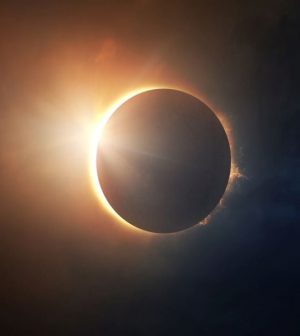- Could Your Grocery Store Meat Be Causing Recurring UTIs?
- Are You Making This Expensive Thermostat Error This Winter?
- Recognizing the Signs of Hypothyroidism
- 10 Strategies to Overcome Insomnia
- Could Artificial Sweeteners Be Aging the Brain Faster?
- Techniques for Soothing Your Nervous System
- Does the Water in Your House Smell Funny? Here’s Why
- Can a Daily Dose of Apple Cider Vinegar Actually Aid Weight Loss?
- 6 Health Beverages That Can Actually Spike Your Blood Sugar
- Treatment Options for Social Anxiety Disorder
One-Third of Americans Don’t Know Vision Risks From Solar Eclipse, Survey Finds

A total eclipse of the sun is coming up next week, and many folks don’t know that watching it unprotected can cause permanent eye damage, a new survey finds.
Nearly 30% of Americans don’t know that looking directly into a solar eclipse without proper eye protection can cause permanent distortions or blind spots in their vision, the researchers found.
“The survey results highlight the need for more community education about the true dangers associated with a total eclipse,” said study author Dr. Nicholas Kman, a clinical professor of emergency medicine at the Ohio State University’s College of Medicine. “We can’t stress enough the importance of proper eye protection.”
About 32 million Americans live in areas along the path of the total solar eclipse set to occur on April 8, researchers said.
A solar eclipse occurs when the moon passes between the Earth and the sun and blocks people’s view of the sun. When that happens, people in the “path of totality” will only be able to see the outer atmosphere of the sun, also known as the corona.
Next week’s eclipse will start in southwest Texas and pass along the United States in a northeasterly line through parts of Oklahoma, Arkansas, Missouri, Kentucky, Tennessee, Illinois, Indiana, Ohio, Pennsylvania, New York, Vermont, New Hampshire and Maine.
Looking at an eclipse is the same as staring directly into the sun, experts said. The corona itself produces ultraviolet rays powerful enough to burn a person’s retinas if they observe the eclipse unprotected.
People who want to watch the eclipse need to purchase specialized eclipse glasses that comply with the ISO 12312-2 international standard, Kman said. These act as powerful sunglasses, screening out UV light that could damage the eyes.
People also can create a pinhole eclipse projector using a cardboard box, Kman said.
Kman noted that the crush of people expected to venture into the path of totality as eclipse tourists will create more health risks.
“Rural parts of the country may not have the infrastructure to handle high traffic and large crowds,” Kman said. “People should expect long waits in traffic and bring essential supplies with them.”
Kman recommends that people in the path of totality gather supplies prior to the event, making sure they have enough food, water and medical supplies to ride it out. A full tank of gas and cash also will be of benefit.
People traveling into the path of the eclipse should plan to be at their chosen viewing location long before the event starts, and expect to be there hours after the it ends, Kman said.
“The total solar eclipse is a rare event and we want people to be safe as they enjoy it,” Kman said.
The poll involved 1,006 people surveyed between Feb. 2 and Feb. 4. The margin of error is plus or minus 3.5 percentage points.
More information
The American Astronomical Society has more on safe solar viewers and filters for the eclipse.
SOURCE: Ohio State University, news release, April 2, 2024
Source: HealthDay
Copyright © 2026 HealthDay. All rights reserved.










